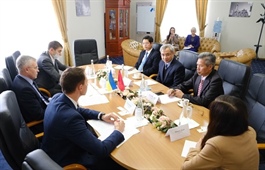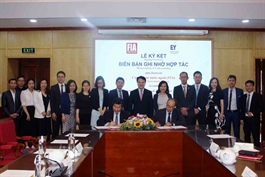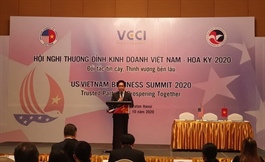Tips for Vietnamese startups to build a business model from scratch
Tips for Vietnamese startups to build a business model from scratch
As the COVID-19 pandemic has spurred demand for online food services, ride-hailing and food delivery firm Grab with its online food delivery and cloud kitchen platforms have proven itself as a saving grace for many food and beverage startups hit hardest by the crisis.

Sai Alluri, head of GrabKitchen & Cloud Retail in South East Asia shared tips with startups
|
The COVID-19 pandemic leads to the closure of many startups and restaurants in the region and across the globe. Grab has recently launched its second cloud kitchen in Singapore, marking its 56th GrabKitchen facility regionally. Grab's move comes as the cloud kitchen market has been heating up in recent time.
Grab began setting up cloud kitchens regionally in 2018. The company said that such centralised food preparation facilities enable merchants to meet the rising demand for food delivery services in cost-effective ways. The first GrabKitchen made its debut in Vietnam last year. After one year of operation, GrabKitchen has seen exponential growth with more offerings to both customers and drivers, backed by Grab’s data and delivery infrastructure. It is clear that GrabKitchen has brewed up a successful recipe in the global health crisis to help food and beverage players sail through the difficult time.
As part of the Grab Ventures Ignite programme in Vietnam on September 30, Sai Alluri, head of GrabKitchen & Cloud Retail in Southeast Asia has shared some valuable insight into the cloud kitchen business model for Vietnamese startups to meet the evolving demand of consumers in the digital era, thereby contributing to building successful startups.
With extensive experience at GrabKitchen since the first days of development, Alluri stressed that early-stage startups should spend time coming up with the vision and strategy for the first one, three, or six months using data and customer feedback. It is important to keep updating startups' vision on a quarterly basis so their team is aligned with the lastest directions, then execute step by step.
“For example, when we have six-month or eight-month vision to build 50 kitchens, we need to go for one kitchen first. The first kitchen may take a longer time to build because we do not understand how the infrastructure pieces and the onboarding works for the restaurant. Once we have understood the process and have the right time with the necessary skill-sets, we can scale the system,” he added.
In addition, early-stage startups should focus on hiring the right team with the necessary skill-sets. Initial teams should be hungry, passionate, and ready to get their hands dirty. They should expect to have their roles constantly change but should adapt. After 12-18 months, startups will be aware of what their business models should be like and the necessary skill-sets. At that time, startups should hire specialists to go deep into each specific area.
Although Grab boasts a large network of cloud kitchens in Southeast Asia, the expansion of the networkis not an easy target to achieve. Alluri shared, “At first it is expected to take the longest time to onboard your first customers because it is very difficult to convince them with no precedents. I had to personally onboard the first five GrabKitchen merchants partners and it took over a month of convincing. But once you have that done, the number of GrabKitchen merchants partners will increase organically and we will be able to scale much faster. Now we are able to onboard 10-12 merchants partners in just a few days.”
Another advice Alluri gives to Vietnamese startups is trying to solve problems for all stakeholders and making sure their business model works for them. Customer love is key. Grab’s team really understands how their business model works, what revenue they need to have, and what basket size they need to have to make it work, and the team works really closely to make sure that happens.
“Secondly, for customers, we want to make sure that GrabKitchen is unique and has a lot of values that other restaurants in the same location do not have. We offer our customer a feature called Mix and Match which essentially has all the things in one menu and the order is also distributed to many merchants. This has taken off really well, Indonesian consumers love it,” he said.
More importantly, early-stage startups should pay attention to the financial aspects to secure sustainable growth in the long term. They should be financially disciplined from day one and understand every single line item of the profit and loss. Hidden costs can become a huge drag if unaccounted for.
“It is also vital for early-stage startups to be ready to pivot constantly, especially for a new business where the unit economics are not proven yet. Instill disruption in the culture of your team so they are constantly looking to improve the model and trying new experiments,” he said. “You should keep innovating to find other ways to make the business grow. 20-30 per cent of my team’s effort always goes into building new strategies to satisfy the needs of the users and the partners.”
|
Grab Ventures Ignite was launched in February 2020 as part of the Grab for Good development roadmap in Vietnam which aims to create greater social and economic benefits for the country through technology. Grab Ventures Ignite is in strategic partnership with Vietnam National Innovation Center (under the Ministry of Planning and Investment) and in association with Singapore’s Infocomm Media Development Authority (IMDA), Gobi Partners, Toong, YKVN, and Amazon Web Services. The accelerator programme is exclusively designed to build capabilities for early-stage startups in Vietnam through world-class workshops, mentorship, peer learning, and market immersions with more than $1 million in investments and in-kind prizes from Grab and its programme partners. |

























